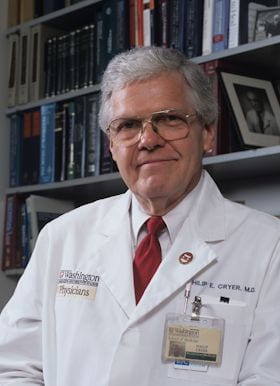
Philip E. Cryer, MD
Professor Emeritus of Medicine
DR. PHILIP E. CRYER PASSED AWAY ON FEBRUARY 24, 2024. READ THE FORMAL OBITUARY.
Biography
A Phi Beta Kappa and Alpha Omega Alpha graduate of Northwestern University and its Medical School, Philip E. Cryer came to Barnes Hospital as a house officer in medicine in 1965. After house staff training and a fellowship in endocrinology and metabolism, and two years at the Naval Medical Research Institute in Bethesda, Maryland, Dr. Cryer became Chief Resident in Medicine at Barnes and joined the Washington University faculty as an Instructor in 1971. He rose to the rank of Professor of Medicine in 1981 and served as the Irene E. and Michael M. Karl Professor of Endocrinology and Metabolism from 1985 until he became Emeritus in 2014. He headed the Washington University General Clinical Research Center (and led it through six NIH site visits) from 1973 to 2006 and was Director of the Division of Endocrinology, Diabetes and Metabolism from 1985 to 2002.
Although he taught in the clinical setting throughout, Dr. Cryer’s major focus was on research in humans. He developed a sensitive method for the measurement of epinephrine and studied the sympathoadrenal system extensively. With Jack Gerich he discovered the physiology of glucose counterregulation, the mechanisms that normally prevent or rapidly correct hypoglycemia. He then studied its pathophysiology leading to iatrogenic hypoglycemia in people with diabetes. The latter studies culminated in his novel concept of hypoglycemia-associated autonomic failure in diabetes and his international leadership in the field.
Dr. Cryer’s research was recognized by his membership in the American Society for Clinical Investigation (which he served as vice president) and the Association of American Physicians and by his receipt of the Banting Medal for Scientific Achievement of the American Diabetes Association, the Claude Bernard Medal of the European Society for the Study of Diabetes and an honorary doctorate from the University of Copenhagen. He held NIH R01 research support for three decades, the last as a MERIT Award, and served on the NIH Metabolism Study Section. Dr. Cryer is the only person in the 75 year history of the ADA to receive its Banting Medal for Scientific Achievement, serve as editor-in-chief of its prestigious journal Diabetes and be elected its President. At the time of his retirement he was honored by the decision of the William and Elaine Wolff family to endow the Philip E. and Carolyn E. Cryer Professor of Endocrinology and Metabolism at Washington University.
Dr. Cryer consistently acknowledged his research sponsors, mentors, collaborators, technicians, research nurses and colleagues, and particularly the 42 postdoctoral fellows who did the bulk of the work and made it better.
Research Interests
The themes of Dr. Cryer’s translational research are studies of the physiology of glucose counterregulation — the mechanisms that normally prevent or rapidly correct hypoglycemia — and of its pathophysiology in type 1 and type 2 diabetes, and the relationship of the latter to clinical hypoglycemia in diabetes.